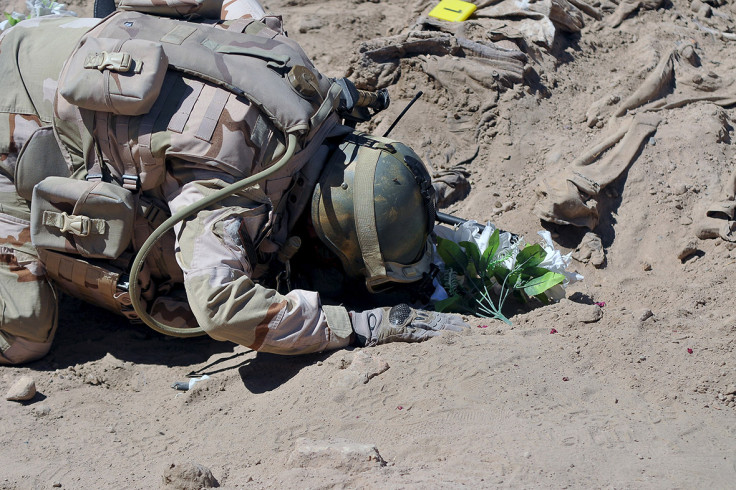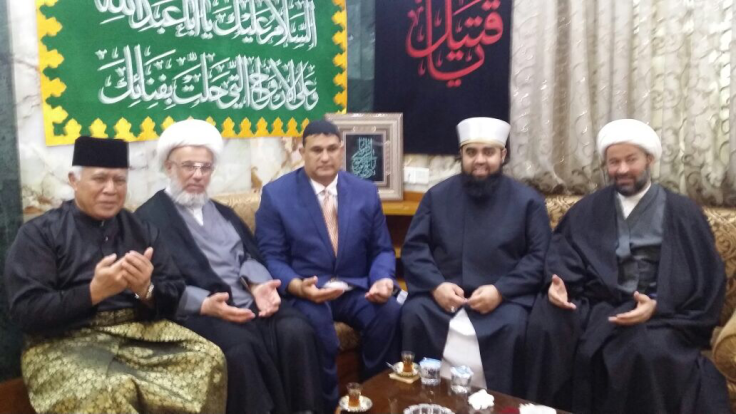Muslim leaders join international delegation to uncover harsh reality of Isis in Iraq
Shia and Sunni Imams from the UK, US and Malaysia visited areas previously held by the Islamic State.
An international delegation of Muslim leaders has returned from the front lines of the battle against the Islamic State (Isis) in Iraq to share with their communities in Britain, the US and Malaysia the cold, harsh reality of life under the militant group.
The three member delegation: Shaykh Muhammad Umar ibn Ramadhan from the Ramadhan Foundation in the UK, General Tan Sri Azumi from the Organisation of Islamic Cooperation in Malaysia and Mohammed Khan from the King Fahad Mosque in Los Angeles spent a week in Iraq visiting areas of the country liberated from the Islamic State and meeting religious, political and military officials.
At the heart of the delegation's mission was the desire to travel to areas where some of worst IS violence had taken place and investigate the effects of its ideology on Iraq's Shia and Sunni communities.
The trio visited the Sunni majority city of Tikrit, the former home of Iraqi leader Saddam Hussein, liberated from Isis in April 2015. Over a thousand Shia military recruits were massacred by IS at camp Speicher in the town when the militant group invaded.
The delegation also visited the Shia town Samarra, one of the northernmost points to hold out against the IS advance and the target of relentless suicide bomb attacks by the militant group because of the presence of holy Shia shrines there.
"This battle and this war against what I call the cancer of Daesh is not just a battle between Iraq and Isis. It is a battle involving the whole world, Muslims and non-Muslims," Umar told IBTimes UK using the Arabic acronym for the group.
"It is extremely important that we do not make this a sectarian or religious conflict with Daesh. We must unite everyone with a common mission to defeat them," he added.
In Baghdad the three men met with Iraq's acting Interior Minister Aqeel al-Khazali and the commander of the Christian Babylon Brigade Rayan al-Kildani who is battling IS in its stronghold of Mosul. Both explained the situation on the ground as Iraqi forces battle IS in its last urban stronghold in the country.

The three leaders were hosted in Iraq by the al-Ataba al-Husayniya Shrine in Karbala, one of the holiest places in Shia Islam and the resting place of Imam Hussein, the third Imam and the grandson of the Prophet Muhammad.
IBTimes UK reporter Callum Paton travelled to Iraq to report on its developing war against Islamic State and the challenges it faces as the militant group's defeat appears imminent.
He visited Iraq's southern Shia heartlands including the cities of Najaf, Karbala and Kufa. He also interviewed officials in the capital Baghdad and visited the cities of Samarra and Tikrit, previously on the front lines of the battle against Isis.
Other articles in the series chronicling the state of Iraq include:
Inside Samarra: Iraq's holy city that has withstood a decade-long Isis and al-Qaeda onslaught
Christian militia taking on Isis: 'They burned our churches, desecrated our monasteries'
Iraq braces for bloody insurgency after Isis jihadis are forced from their Mosul stronghold
They used to be jailed for losing games - now Iraq's players want to bring football back home
Shia families told 'don't weep for our martyrs' as fathers and sons die in holy war against Isis
They visited a number of Shia shrines in the religious group's southern heartlands in Iraq and met with senior clerics including the spokesman for Ayatollah Sistani in Karbala Sheikh Abdul Mahdi al-Karbalaey. In a deeply symbolic act the Sunni delegation prayed alongside Shia worshippers at Friday prayers to show Muslim solidarity over the religious divide.
"The perception that [the conflict] is very deeply sectarian, I think that is a false perception. Iraqi people have a history of inter marriages between Sunni and Shia, they have a history of working with one another in many different aspects of life and it is just this new political reality that has torn people apart in different areas," Mohammed Khan said.
"I think our perception that the sectarian wedge is in so deep that it can never be repaired, I think that is completely false. I think it's an artificially sectarian conflict now. I think it is more political than is often reported and that is what has ignited the situation," he added.
Information the group gathered on the ground is of crucial importance to their communities at home, where they are battling against extremism of the kind exported by Isis.

The Muslim community in greater Manchester and in the West Midlands, where Shaykh Umar is based, have been left reeling after a number of young people were radicalised and then travelled to join IS. In Malaysia, the pervasiveness of radical preachers has contributed to a growing terror threat with the US seeing increased instances of home-grown terror attacks.
"Definitely at home people will hear my stories and hear the fact that for thousands of years Sunni and Shia, Sufis and Christians have lived together in the cradle of civilisation," Mohammed Khan said.
"We must defeat the evil ideology which calls Muslims non-Muslims if they disagree. We must not have retribution in blood after the battle with Daesh," Shaykh Umar said.
Callum Paton travelled to Iraq courtesy of the Ramadhan Foundation in the UK and the Shrine Al-Ataba Al-Husayniya in Iraq.
© Copyright IBTimes 2025. All rights reserved.






















